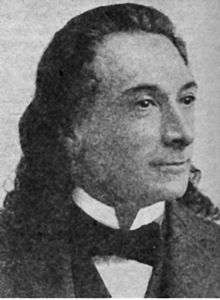Naftali Herz Imber
Naftali Herz Imber (Hebrew: נפתלי הרץ אימבר, Yiddish: נפתלי הערץ אימבער; December 27, 1856 – October 8, 1909) was a Jewish Hebrew-language poet, most notable for writing a poem on which "Hatikvah", the Israeli national anthem, is based.
Naftali Herz Imber | |
|---|---|
 | |
| Born | Naftali Herz Imber 27 December 1856 |
| Died | 8 October 1909 (aged 52) |
| Resting place | Givat Shaul Cemetery, Jerusalem, Israel 31°47′53.28″N 35°10′39.82″E |
| Known for | Hatikvah (The Hope) |
Life and work
Imber was born in Złoczów (now Zolochiv, Ukraine), a city in Galicia, which then was part of the Austro-Hungarian Empire. He began writing poetry at the age of 10 and several years later received an award from Emperor Franz Joseph for a poem on the centenary of Bukovina's joining to the Austrian Empire. In his youth he traveled through Hungary, Serbia, and Romania.
In 1882 Imber moved to Ottoman Palestine as a secretary of Sir Laurence Oliphant. He lived with Oliphant and his wife Alice in their homes in Haifa and Daliyat al-Karmel.[1]
In 1886, he published his first book of poems, Morning Star (ברקאי Barkai), in Jerusalem. One of the book's poems was Tikvateinu ("Our Hope"); its very first version was written already in 1877 in Iaşi, Romania. This poem soon became the lyrics of the Zionist anthem and later the Israeli national anthem Hatikvah.
In 1887 he returned to Europe and lived in London; then traveled again, visited India and finally moved to the United States in 1892. While living in Chicago he was married for about one year to Amanda Katie Davidson, a woman described by Israel Zangwill as "a Christian crank." The marriage ended in divorce.[2]
Imber made a mockery of the serious and had a sardonic vulgar wit.[3] Apart from writing his own poems, Imber also translated Omar Khayyam into Hebrew.[4] Additionally, he published Treasures of Two Worlds: Unpublished Legends and Traditions of the Jewish Nation (1910), which posited that the Tabernacle carried by the Hebrews during their 40 years in the desert contained an electrical generator, and that King Solomon invented the telephone.[5]
Imber died penniless in New York City on October 8, 1909 from the effects of chronic alcoholism, nonetheless beloved by the local Jewish community.[2] He had made prior arrangement for his burial by selling a poem, but with his immediate family living in Europe and unavailable to make his funeral arrangements, there was controversy about the cemetery in which he was to be buried.[6] He was buried in Mount Zion Cemetery in Queens,[7] but re-interred at Givat Shaul Cemetery, also called Har HaMenuchot Cemetery, in Jerusalem in 1953.
References
- Streetwise: Rehov Oliphant, Haifa, Jerusalem Post
- Vivian Eden (24 August 2015). "Evil Spirits Lurking in Israel's National Anthem". Haaretz. Retrieved 24 August 2015.
- Lipsky, Louis (1977). Thirty Years of American Zionism, (republished). Manchester, N.H.: Ayer Publishing. pp. 11–12. ISBN 978-0-405-10263-9.
- "The Poet Of Zion Suffers Paralysis - Naphtali Herz Imber, Beloved by His People on the East Side, Dying in a Hospital - Wrote In Classic Hebrew - His "Hatikvah," the Zionist Hymn, Is Sung by Jews All Over the World". New York Times. October 8, 1909. p. 9. Retrieved 24 October 2015.
- See Google Books
- "East Side Poet Is Dead - Strife Over Honor of Burying Author of Zionist National Anthem". New York Times. October 9, 1909. p. 9. Retrieved 24 October 2015.
- "10,000 Follow Bier Of The Zion Poet - With His Zionist Song "Hatikvah" Beside Him, Imber Is Buried from Educational Alliance - Eulogized As A Child - The Poet Never Grew Up from His Boyhood Estate, Says the Rev. J.L. Magnes". New York Times. October 11, 1909. p. 9. Retrieved 24 October 2015.
External links
